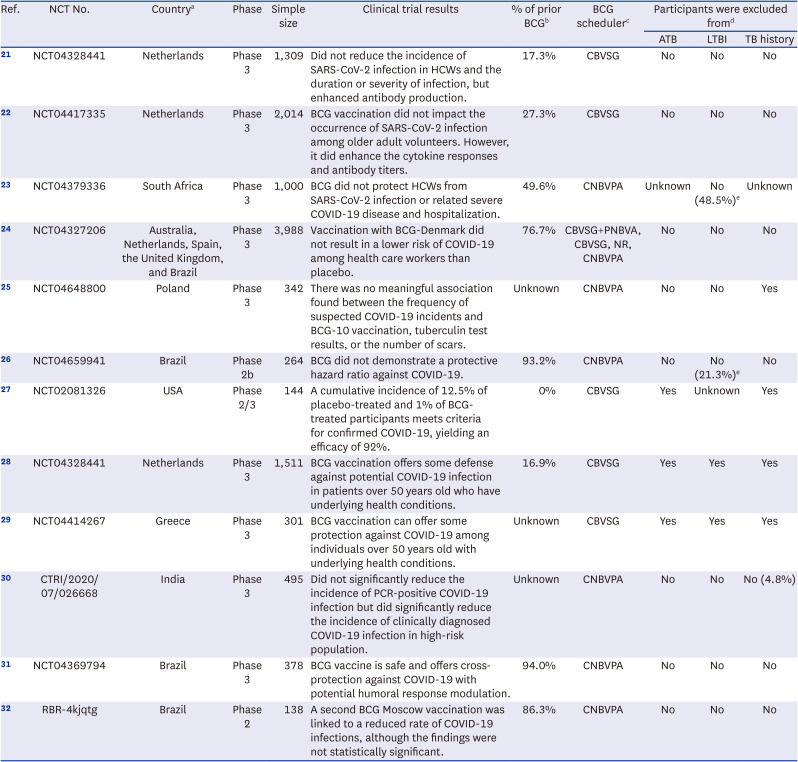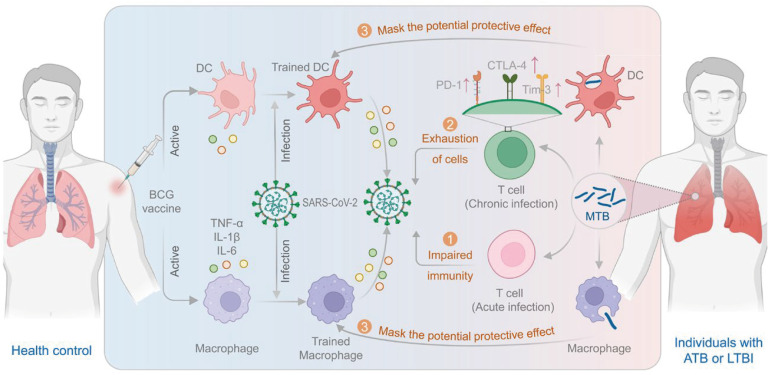1. Jeyanathan M, Vaseghi-Shanjani M, Afkhami S, Grondin JA, Kang A, D’Agostino MR, et al. Parenteral BCG vaccine induces lung-resident memory macrophages and trained immunity via the gut-lung axis. Nat Immunol. 2022; 23(12):1687–1702. PMID:
36456739.
2. Cirovic B, de Bree LC, Groh L, Blok BA, Chan J, van der Velden WJ, et al. BCG vaccination in humans elicits trained immunity via the hematopoietic progenitor compartment. Cell Host Microbe. 2020; 28(2):322–334.e5. PMID:
32544459.
3. Kühtreiber WM, Tran L, Kim T, Dybala M, Nguyen B, Plager S, et al. Long-term reduction in hyperglycemia in advanced type 1 diabetes: the value of induced aerobic glycolysis with BCG vaccinations. NPJ Vaccines. 2018; 3(1):23. PMID:
29951281.
4. Arts RJ, Moorlag SJ, Novakovic B, Li Y, Wang SY, Oosting M, et al. BCG vaccination protects against experimental viral infection in humans through the induction of cytokines associated with trained immunity. Cell Host Microbe. 2018; 23(1):89–100.e5. PMID:
29324233.
5. van Puffelen JH, Keating ST, Oosterwijk E, van der Heijden AG, Netea MG, Joosten LA, et al. Trained immunity as a molecular mechanism for BCG immunotherapy in bladder cancer. Nat Rev Urol. 2020; 17(9):513–525. PMID:
32678343.
6. Singh AK, Praharaj M, Lombardo KA, Yoshida T, Matoso A, Baras AS, et al. Re-engineered BCG overexpressing cyclic di-AMP augments trained immunity and exhibits improved efficacy against bladder cancer. Nat Commun. 2022; 13(1):878. PMID:
35169141.
7. Bible E. Multiple sclerosis: disease activity is reduced in CIS after BCG vaccination. Nat Rev Neurol. 2014; 10(2):62. PMID:
24394290.
8. Leentjens J, Kox M, Stokman R, Gerretsen J, Diavatopoulos DA, van Crevel R, et al. BCG vaccination enhances the immunogenicity of subsequent influenza vaccination in healthy volunteers: a randomized, placebo-controlled pilot study. J Infect Dis. 2015; 212(12):1930–1938. PMID:
26071565.
9. Scheid A, Borriello F, Pietrasanta C, Christou H, Diray-Arce J, Pettengill MA, et al. Adjuvant effect of Bacille Calmette-Guérin on hepatitis B vaccine immunogenicity in the preterm and term newborn. Front Immunol. 2018; 9:29. PMID:
29416539.
10. Aspatwar A, Gong W, Wang S, Wu X, Parkkila S. Tuberculosis vaccine BCG: the magical effect of the old vaccine in the fight against the COVID-19 pandemic. Int Rev Immunol. 2022; 41(2):283–296. PMID:
33960271.
11. Escobar LE, Molina-Cruz A, Barillas-Mury C. BCG vaccine protection from severe coronavirus disease 2019 (COVID-19). Proc Natl Acad Sci U S A. 2020; 117(30):17720–17726. PMID:
32647056.
12. Ebina-Shibuya R, Horita N, Namkoong H, Kaneko T. Current national policies for infant universal Bacille Calmette-Guérin vaccination were associated with lower mortality from coronavirus disease 2019. Clin Exp Vaccine Res. 2020; 9(2):179–182. PMID:
32864376.
13. Singh S, Maurya RP, Singh RK. “Trained immunity” from Mycobacterium spp. exposure or BCG vaccination and COVID-19 outcomes. PLoS Pathog. 2020; 16(10):e1008969. PMID:
33119725.
14. Berg MK, Yu Q, Salvador CE, Melani I, Kitayama S. Mandated Bacillus Calmette-Guérin (BCG) vaccination predicts flattened curves for the spread of COVID-19. Sci Adv. 2020; 6(32):eabc1463. PMID:
32923613.
15. Abdulah DM, Hassan AB. Exploration of association between respiratory vaccinations with infection and mortality rates of COVID-19. Disaster Med Public Health Prep. 2021; 17:e14. PMID:
33588980.
16. Joy M, Malavika B, Asirvatham ES, Sudarsanam TD, Jeyaseelan L. Is BCG associated with reduced incidence of COVID-19? A meta-regression of global data from 160 countries. Clin Epidemiol Glob Health. 2021; 9:202–203. PMID:
33163696.
17. Marín-Hernández D, Nixon DF, Hupert N. Anticipated reduction in COVID-19 mortality due to population-wide BCG vaccination: evidence from Germany. Hum Vaccin Immunother. 2021; 17(8):2451–2453. PMID:
33544024.
18. Gong W, Mao Y, Li Y, Qi Y. BCG vaccination: a potential tool against COVID-19 and COVID-19-like Black Swan incidents. Int Immunopharmacol. 2022; 108:108870. PMID:
35597119.
19. Islam MZ, Zahan MK, Al-Bari MA. Convergence between global BCG vaccination and COVID-19 pandemic. J Med Virol. 2021; 93(3):1496–1505. PMID:
32827313.
20. Pittet LF, Messina NL, Curtis N. BCG to protect against COVID-19 in health care workers. Reply. N Engl J Med. 2023; 389(2):192. PMID:
37437156.
21. Claus J, Ten Doesschate T, Gumbs C, van Werkhoven CH, van der Vaart TW, Janssen AB, et al. BCG vaccination of health care workers does not reduce SARS-CoV-2 infections nor infection severity or duration: a randomized placebo-controlled trial. mBio. 2023; 14(2):e0035623. PMID:
36976004.
22. Moorlag SJ, Taks E, Ten Doesschate T, van der Vaart TW, Janssen AB, Müller L, et al. Efficacy of BCG vaccination against respiratory tract infections in older adults during the coronavirus disease 2019 pandemic. Clin Infect Dis. 2022; 75(1):e938–e946. PMID:
35247264.
23. Upton CM, van Wijk RC, Mockeliunas L, Simonsson US, McHarry K, van den Hoogen G, et al. Safety and efficacy of BCG re-vaccination in relation to COVID-19 morbidity in healthcare workers: A double-blind, randomised, controlled, phase 3 trial. EClinicalMedicine. 2022; 48:101414. PMID:
35582122.
24. Pittet LF, Messina NL, Orsini F, Moore CL, Abruzzo V, Barry S, et al. Randomized trial of BCG vaccine to protect against COVID-19 in health care workers. N Engl J Med. 2023; 388(17):1582–1596. PMID:
37099341.
25. Czajka H, Zapolnik P, Krzych Ł, Kmiecik W, Stopyra L, Nowakowska A, et al. A multi-center, randomised, double-blind, placebo-controlled phase iii clinical trial evaluating the impact of BCG re-vaccination on the incidence and severity of SARS-CoV-2 infections among symptomatic healthcare professionals during the COVID-19 pandemic in Poland—first results. Vaccines (Basel). 2022; 10(2):314. PMID:
35214772.
26. Santos AP, Werneck GL, Dalvi AP, Dos Santos CC, Tierno PF, Condelo HS, et al. The effect of BCG vaccination on infection and antibody levels against SARS-CoV-2-The results of ProBCG: a multicenter randomized clinical trial in Brazil. Int J Infect Dis. 2023; 130:8–16. PMID:
36841502.
27. Faustman DL, Lee A, Hostetter ER, Aristarkhova A, Ng NC, Shpilsky GF, et al. Multiple BCG vaccinations for the prevention of COVID-19 and other infectious diseases in type 1 diabetes. Cell Rep Med. 2022; 3(9):100728. PMID:
36027906.
28. Ten Doesschate T, van der Vaart TW, Debisarun PA, Taks E, Moorlag SJ, Paternotte N, et al. Bacillus Calmette-Guérin vaccine to reduce healthcare worker absenteeism in COVID-19 pandemic, a randomized controlled trial. Clin Microbiol Infect. 2022; 28(9):1278–1285. PMID:
35489606.
29. Tsilika M, Taks E, Dolianitis K, Kotsaki A, Leventogiannis K, Damoulari C, et al. ACTIVATE-2: a double-blind randomized trial of BCG vaccination against COVID-19 in individuals at risk. Front Immunol. 2022; 13:873067. PMID:
35865520.
30. Sinha S, Ajayababu A, Thukral H, Gupta S, Guha SK, Basu A, et al. Efficacy of Bacillus Calmette-Guérin (BCG) vaccination in reducing the incidence and severity of COVID-19 in high-risk population (BRIC): a phase III, multi-centre, quadruple-blind randomised control trial. Infect Dis Ther. 2022; 11(6):2205–2217. PMID:
36242739.
31. Jalalizadeh M, Buosi K, Dionato FA, Dal Col LS, Giacomelli CF, Ferrari KL, et al. Randomized clinical trial of BCG vaccine in patients with convalescent COVID-19: clinical evolution, adverse events, and humoral immune response. J Intern Med. 2022; 292(4):654–666. PMID:
35599154.
32. Dos Anjos LR, da Costa AC, Cardoso AD, Guimarães RA, Rodrigues RL, Ribeiro KM, et al. Efficacy and safety of BCG revaccination with
M. Bovis BCG Moscow to prevent COVID-19 infection in health care workers: a randomized phase II clinical trial. Front Immunol. 2022; 13:841868. PMID:
35392074.
33. Gong W, Liu Y, Xue Y, Zhuang L. Two issues should be noted when designing a clinical trial to evaluate BCG effects on COVID-19. Front Immunol. 2023; 14:1207212. PMID:
37287961.
34. Scioscia G, Lacedonia D, Giuffreda E, Caccavo I, Quarato CM, Soccio P, et al. Adaptive immunity in different CT patterns of active tuberculosis and possible variability according to patients’ geographic provenience. Front Med (Lausanne). 2022; 9:890609. PMID:
36160177.
35. Shah M, Dorman SE. Latent Tuberculosis Infection. N Engl J Med. 2021; 385(24):2271–2280. PMID:
34879450.
36. Cheng P, Jiang F, Wang G, Wang J, Xue Y, Wang L, et al. Bioinformatics analysis and consistency verification of a novel tuberculosis vaccine candidate HP13138PB. Front Immunol. 2023; 14:1102578. PMID:
36825009.
37. Jiang F, Peng C, Cheng P, Wang J, Lian J, Gong W. PP19128R, a multiepitope vaccine designed to prevent latent tuberculosis infection, induced immune responses
in silico and
in vitro assays. Vaccines (Basel). 2023; 11(4):856. PMID:
37112768.
38. Chow A, Perica K, Klebanoff CA, Wolchok JD. Clinical implications of T cell exhaustion for cancer immunotherapy. Nat Rev Clin Oncol. 2022; 19(12):775–790. PMID:
36216928.
39. Lombardi A, Villa S, Castelli V, Bandera A, Gori A. T-cell exhaustion in Mycobacterium tuberculosis and nontuberculous mycobacteria infection: pathophysiology and therapeutic perspectives. Microorganisms. 2021; 9(12):9.
40. Jayaraman P, Jacques MK, Zhu C, Steblenko KM, Stowell BL, Madi A, et al. TIM3 mediates T cell exhaustion during mycobacterium tuberculosis infection. PLoS Pathog. 2016; 12(3):e1005490. PMID:
26967901.
41. Sada-Ovalle I, Ocaña-Guzman R, Pérez-Patrigeón S, Chávez-Galán L, Sierra-Madero J, Torre-Bouscoulet L, et al. Tim-3 blocking rescue macrophage and T cell function against
Mycobacterium tuberculosis infection in HIV+ patients. J Int AIDS Soc. 2015; 18(1):20078. PMID:
26486200.
42. Wang PH, Wu MF, Hsu CY, Lin SY, Chang YN, Lee HS, et al. The dynamic change of immune checkpoints and CD14+ monocytes in latent tuberculosis infection. Biomedicines. 2021; 9(10):1479. PMID:
34680598.
43. Singh S, Kishore D, Singh RK, Pathak C, Ranjan K. Higher BCG-induced trained immunity prevalence predicts protection from COVID-19: implications for ongoing BCG trials. Clin Transl Discov. 2022; 2(2):e60. PMID:
35938058.
44. O’Neill LA, Netea MG. BCG-induced trained immunity: can it offer protection against COVID-19? Nat Rev Immunol. 2020; 20(6):335–337. PMID:
32393823.
45. Lindestam Arlehamn CS, McKinney DM, Carpenter C, Paul S, Rozot V, Makgotlho E, et al. A quantitative analysis of complexity of human pathogen-specific CD4 T cell responses in healthy
M. tuberculosis infected South Africans. PLoS Pathog. 2016; 12(7):e1005760. PMID:
27409590.
46. Madan M, Baldwa B, Raja A, Tyagi R, Dwivedi T, Mohan A, et al. Impact of latent tuberculosis on severity and outcomes in admitted COVID-19 patients. Cureus. 2021; 13(11):e19882. PMID:
34966601.
47. Blossey AM, Brückner S, May M, Parzmair GP, Sharma H, Shaligram U, et al. VPM1002 as prophylaxis against severe respiratory tract infections including coronavirus disease 2019 in the elderly: a phase 3 randomized, double-blind, placebo-controlled, multicenter clinical study. Clin Infect Dis. 2023; 76(7):1304–1310. PMID:
36358012.






 PDF
PDF Citation
Citation Print
Print



 XML Download
XML Download